May 14, 2025 | 12:08 GMT +7
May 14, 2025 | 12:08 GMT +7
Hotline: 0913.378.918
May 14, 2025 | 12:08 GMT +7
Hotline: 0913.378.918
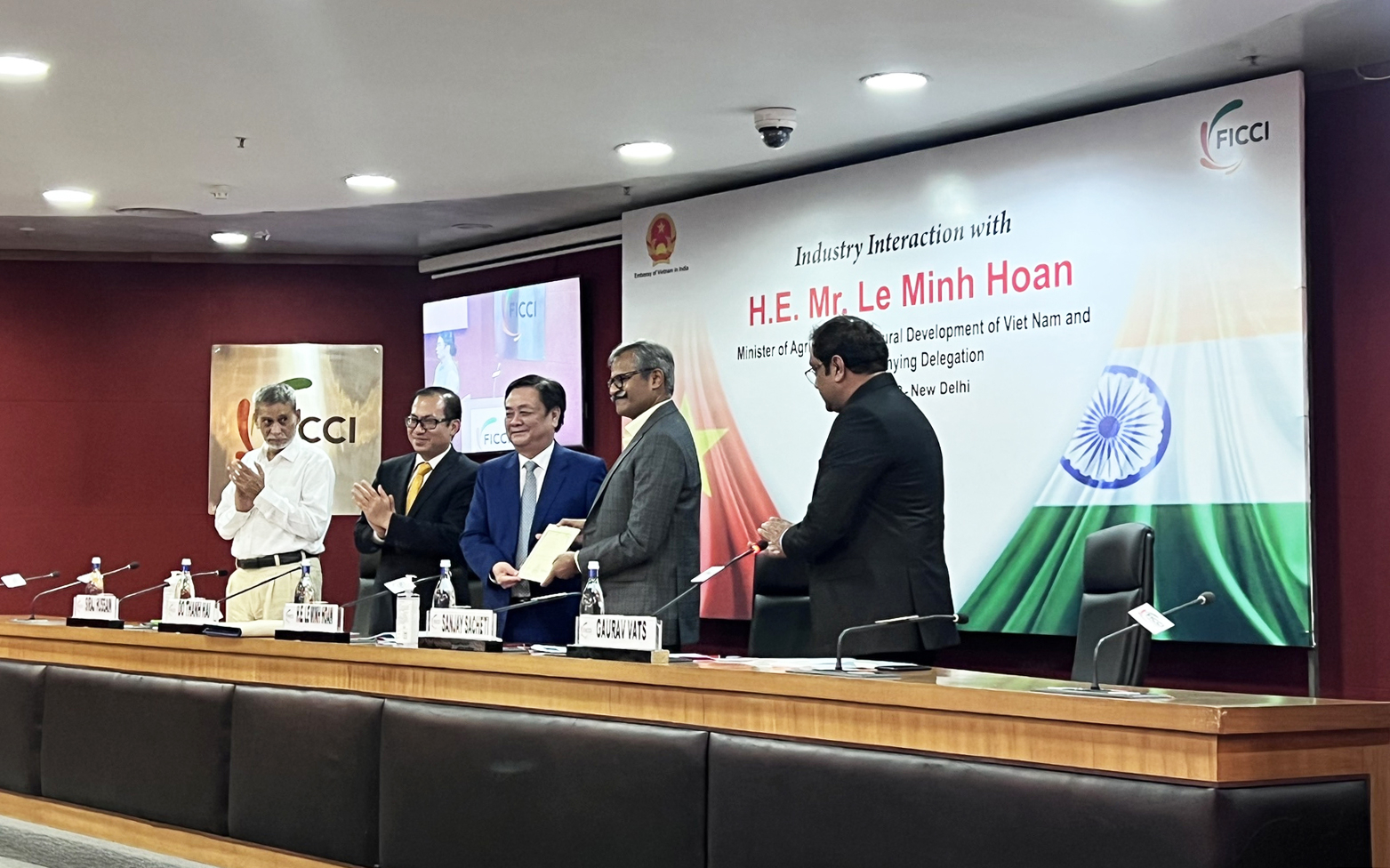
MARD Minister Le Minh Hoat interacts with Indian delegates at the International Forum on Agriculture. Photo: ICD.
Attending the International Forum on Agriculture in India is an opportunity to understand more about the current state of the world, innovations, proposals, scientific achievements, and creative applications. The central theme, “One Earth – One Family – One Future,” prompts thoughts on interconnected, intergovernmental issues.
The multilateral forum brings together many countries, organizations, and partners, so each delegate’s speech was limited to a few minutes. Therefore, it is not easy to grasp what everyone was introducing, but it is still possible to have a general sense of quite new, realistic approaches. The world is extremely vast, with more than 200 countries and territories. The host country, India, has become the most populous country in the world, covering most of the subcontinent. However, whether the country is the richest or the most disadvantaged, developed or developing, the most populous or the least populous, they all work towards mutual goals, including food security, nutritional balance, sustainable development in the context of climate change, and stability, nonetheless facing challenges along the way.
While the world is solving many problems, a forum dedicated to agriculture is still prioritized with active participation from many countries. No matter how prosperous, powerful, industrialized, or digitized a country is, food is always a primary concern to every family, every country, and the whole planet. The world is becoming more “flat” and interconnected, but each country is asserting its position, searching for opportunities, looking horizontally, and learning from one another. In doing so, all join hands to solve urgent problems and move forward together, benefiting from a “win-win” situation. Perhaps the Indian Prime Minister Narendra Modi captured it all in the opening speech: “Agriculture is the heart of human civilization and will continue to be the future of mankind.”
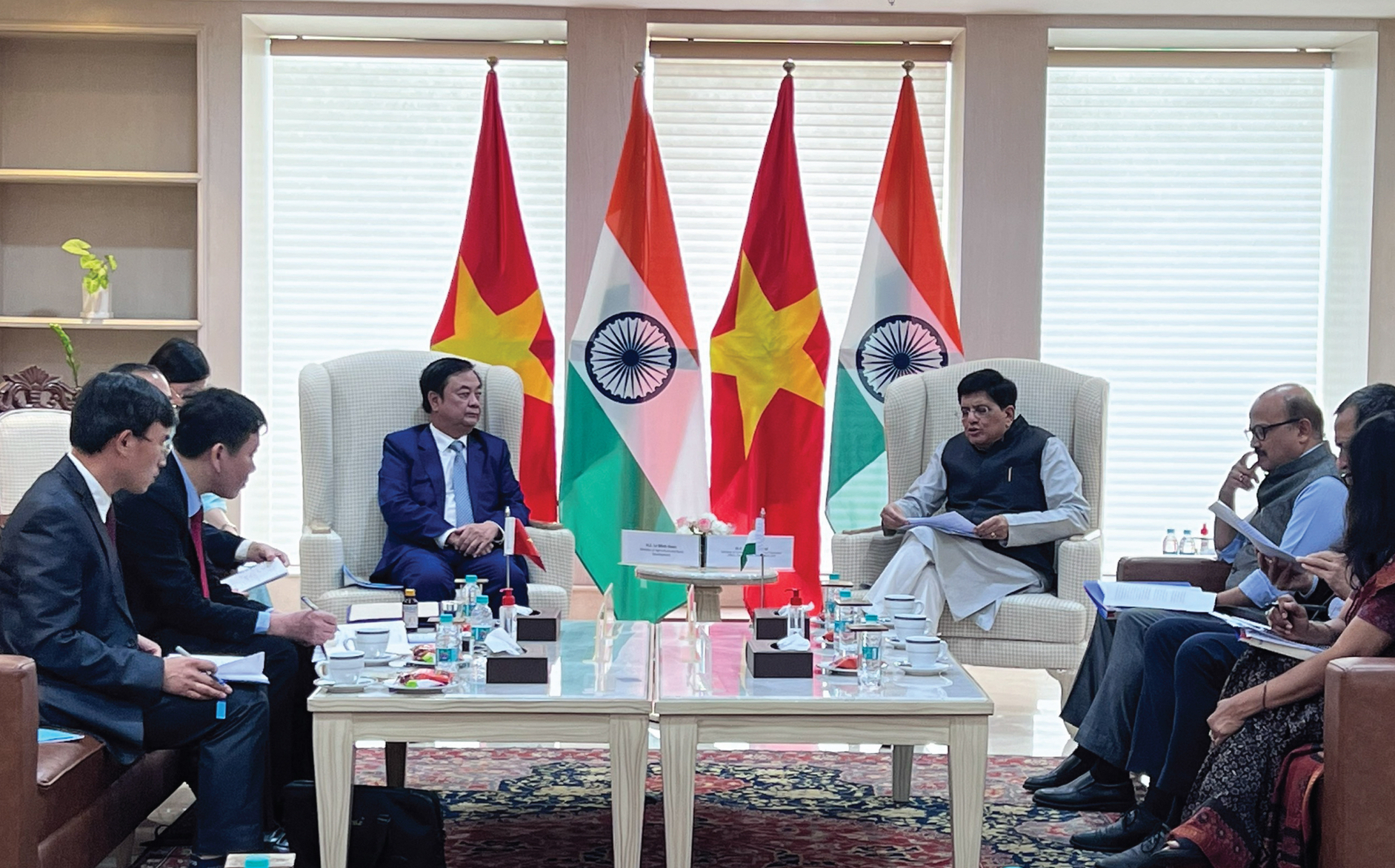
Minister Le Minh Hoan meets with Indian Minister of Trade and Industry Piyush Goyal. Photo: ICD.
My first realization is that agriculture in all countries is facing somewhat the same challenges: decreasing agricultural land, climate change, water crisis, widespread disease, increased input costs due to scarcity of raw materials and disruptions, fragmented logistics chain, output crisis due to global trade being dominated by protectionist policies, shifting consumption trends towards nutritious, healthy, green products, etc. These challenges directly affect agriculture, especially small-scale farmers. These vulnerable farmers are key contributors to world food security. These farmers, for their direct engagement in cultivation and production, need to have access to science, technology, and innovation so as to improve their resilience to uncertainties and overcome the risks of climate change.
Next, there have been national programs with support and consultancy from international organizations, transferring new discoveries, and scientific solutions by ways of organizing collective learning so that farmers can learn, understand and implement. Countries are searching for diverse, appropriate, and synchronous solutions to transform farming methods that can positively change lives, supplementing farmers with necessary resources, knowledge, and skills so that they are more productive in value chains. Every scientific and innovative research, whether large or small-scale, is inseparable from the needs of millions of small-scale farmers.
A highlight is that many initiatives have helped women and youth in rural areas access start-up programs in the agricultural sector. Many countries prioritize the policy to form new farming groups, bridging science, technology, and digital transformation in agriculture to remote rural areas. Globally, countries aim to support farmers to improve their ability to adapt to new technology, shifting from old habits in cultivation. In doing so, they hope to form a technology ecosystem for rural communities and minimize risks and impacts due to natural disasters, epidemics, high input costs, or sudden changes.
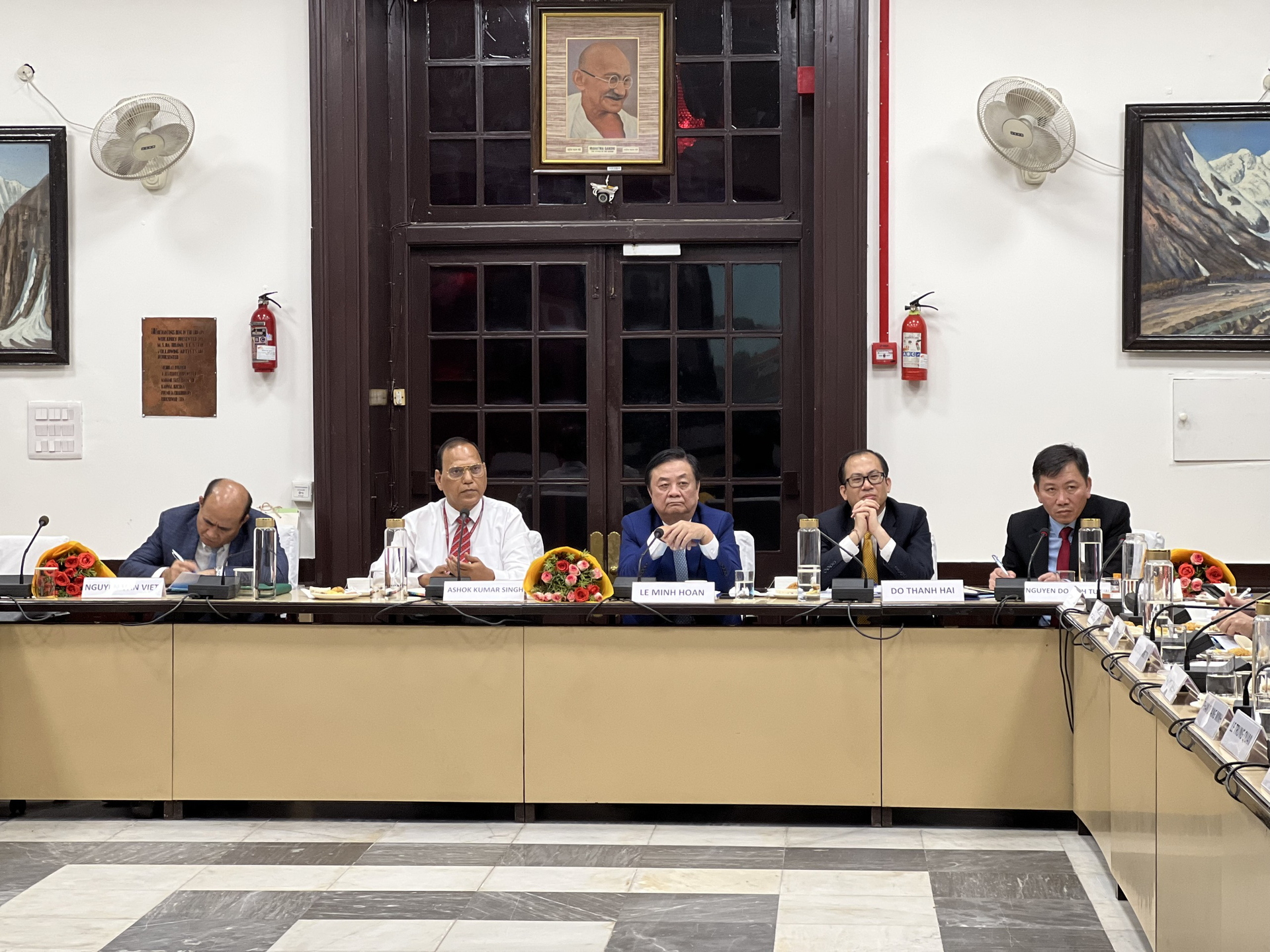
Delegates attended the Vietnam - India Agribusiness Connection Forum. Photo: ICD.
Notably, farmers’ welfare is also a focus of the discussion, not only simply by policies of poverty reduction. Farmers’ welfare is conditioned by companionship, understanding of technology, conversation with scientists, and agricultural extension forces, thereby increasing their ability to handle situations in the field. It is impressive to see the image of a farmer appearing smiling brightly, full of happiness on the promotional materials. It was even more impressive to see, in the exposition about science and technology achievements in agriculture, an image of a farmer sitting in the middle of the field, connecting to radio channels and smart devices, to receive advice from local departments. And it was emotional to see the message “Empowering Farmers” hanging above all booths at the exposition.
There are research-based devices to assist farmers, such as test kits that analyze soil quality and help improve soil nutrients. Drone devices with integrated sensors can identify pest parameters, analyze data and make accurate fertilizer spraying decisions to avoid waste. Much research creates various product lines from a single key agricultural product, such as cosmetics, and pharmaceuticals from flowers, stems, branches, leaves, and roots of a plant. Many experiments also alter genes to create specialized rice grains, catering to consumers’ diverse tastes. Scientific, cutting-edge, innovative products all target to accommodate farmers’ needs, in accordance with the strategy of “Empowering Farmers”.
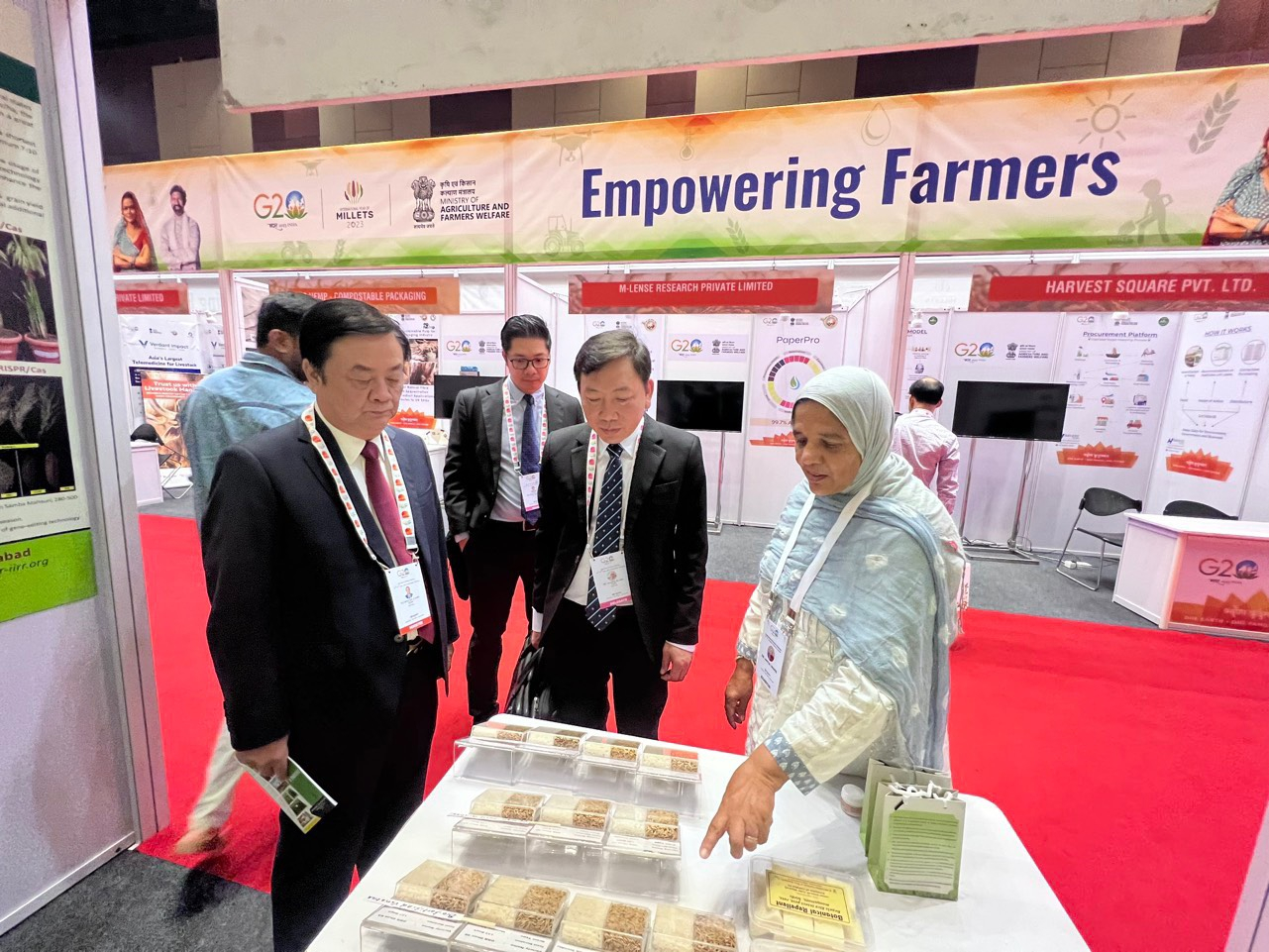
Minister Le Minh Hoan visits a booth where designer presents her research. Photo: ICD.
The exchange with the Agricultural Research Council posed many thoughts about how science and technology should be implemented. The term “Agricultural Research” alone shows this organization’s mission, comprehensiveness, and synchronism. They aim to develop the agricultural sector, not only by implementing science and technology but also by considering economic factors, rural sociology, and farmer welfare policy. Science and technology-based solutions have integrated from many disciplines: soil nutrition, varieties and hybrid technology, production processes, irrigation solutions, pest control; harvest and post-harvest technology; organic and green ingredients; data platforms and digitization; agricultural education, farmer training; machinery and equipment to help increase productivity.
The Council connects many scientific organizations to facilitate the research that must serve the agricultural development strategy of the country. The connection between scientific organizations and integrated thinking between departments helps to synchronize research activities and create value for society. The Council consists of research institutes closely linked with universities and agricultural science centers at the district level, creating an ecosystem of synchronous agricultural research and development, aiming to promote agricultural innovation to small-scale farmers.
A close bond association with scientific organizations is necessary because no single organization has enough resources to create a synchronous solution. Factors under consideration are specialized techniques, technology, machinery and equipment, economics, and marketization, among others. More deeply, that is the spirit of collaboration between research organizations. The connection between institutes, universities, and local science centers ensures that research is highly applicable, extensive, and valuable. It demonstrates the spirit to transform value from scientific research to real-life practice. Perhaps collaborative research thinking and shared value thinking constitute the scientific spirit.
A former Ministry leader once thought that if our research does not follow a unified direction, it will not align with the Strategy for Sustainable Agriculture and Rural Development. The Strategy’s core values are to reduce costs, increase quality, diversify processed products; shift from agricultural production thinking to agricultural economic thinking, from single-value growth to multi-value integration. These are strategies towards green, ecological, circular, and nature-positive. Approaches from the Strategy must be justified in scientific activity and technological solutions. At the same time, research topics and useful solutions need to be promoted in a large space and deliver value to businesses and farmers.
The challenges and risks to agriculture are similar across countries, although they may vary in level. Industrialization and urbanization create conflicts in the development process. Rural people migrate to urban areas, leaving the vulnerable in the countryside. The point is to find an adaptive solution, instead of complaining and blaming. When it comes to drought and heat, understanding that water storage for irrigation is not the only solution, India has researched and created thousands of seed varieties that can adapt to water shortage and heat-resistant conditions. As input costs increase, research on technological solutions to save the number of seeds and fertilizers is required. Regarding pests, the research aims to change plants’ genes, increasing resistance to multiple diseases. Scientific activities also utilize local knowledge to limit the harmful effects of insects.
The unpredictable state of the world further shows that nothing is fixed. Flexible change and proactive adaptation are always the driving forces, pushing each organization and country forward. Perpetual is often seen as perfect, but it also requires a sense of momentum not to be passive while the world is witnessing rapid and relentless changes. For every difficulty and challenge, there is a solution. Successful people look for solutions, and losers find excuses.
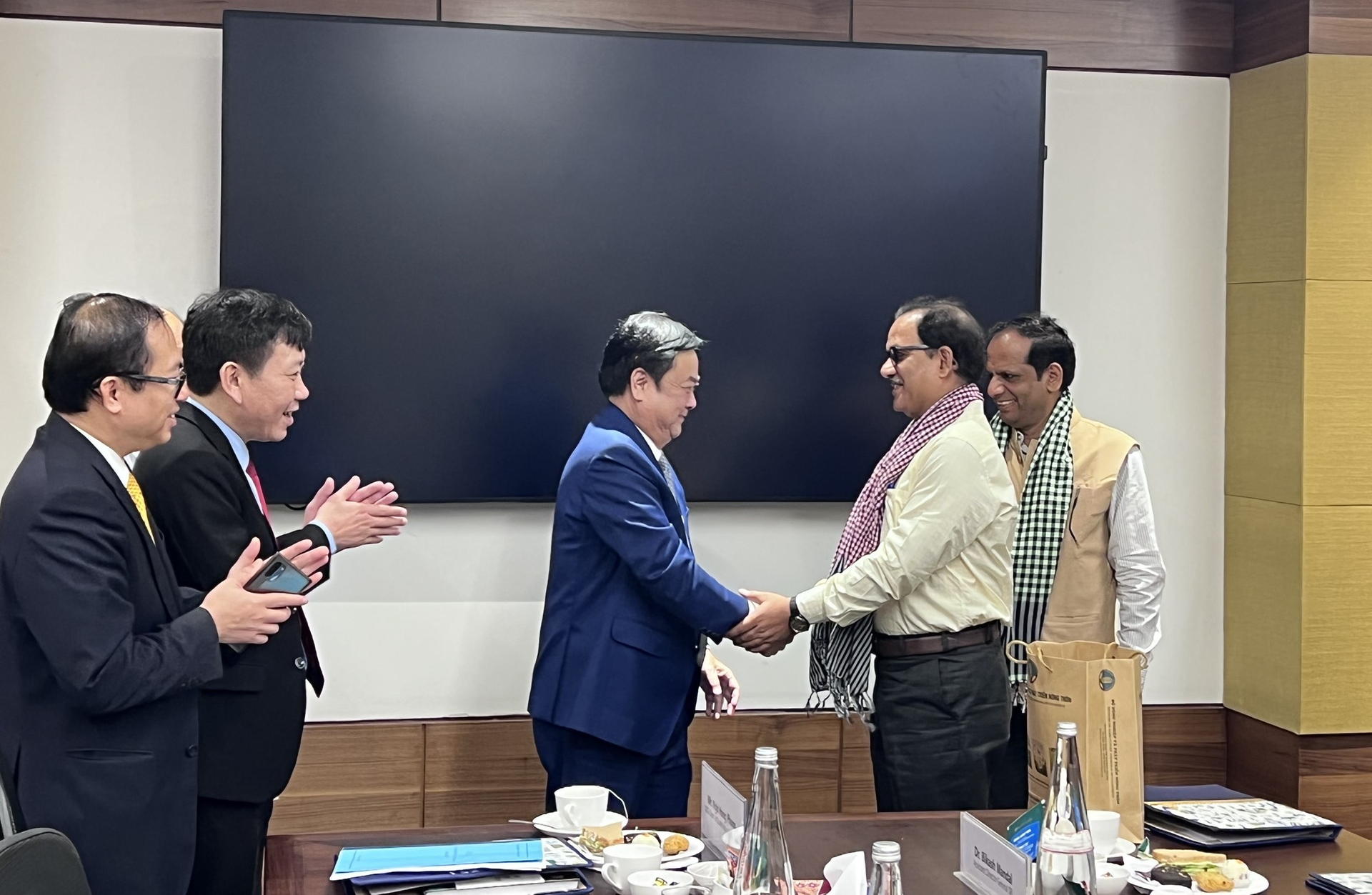
Minister Le Minh Hoan exchanges gift with Indian delegates. Photo: ICD.
The meeting with a leading seed company comes with many surprises. At the beginning of the presentation, the speaker does not immediately introduce the business’s potential, but instead offers an overview of the country’s Agricultural Strategy, including research achievements in the seed industry. Next, the speaker provides brief information about the company’s research and technology capabilities. The presentation also analyzes how integrated technology and digitization are gradually becoming popular, which optimizes products for farmers to use. The formation of business clubs creates the best conditions for businesses to reach out, expand, and gradually dominate the world market.
Leaving the Global Agriculture Forum and the diamond-shaped country, I still feel emotional with the solemn images of farmers on billboards along the streets. It is true that farmers are the subject, are the force towards policy changes, and agriculture-based technologies. Significantly, the general message throughout the conference is directed toward small-scale households and vulnerable farmers who are easily left behind.
I recalled a quote: “I was born in the countryside and my parents are farmers”.
Translated by Quynh Chi
![Multi-channel, multi-directional Vietnamese agricultural markets: [5] Safety is the key](https://t.ex-cdn.com/nongnghiepmoitruong.vn/608w/files/linhnhp/2025/05/13/trai-cay-viet-nam-170345_133-221148-0908330.jpg)
(VAN) The Middle Eastern market presents new opportunities for Vietnamese agricultural products, but safety in product quality, payment, and partnership relations is a fundamental principle.
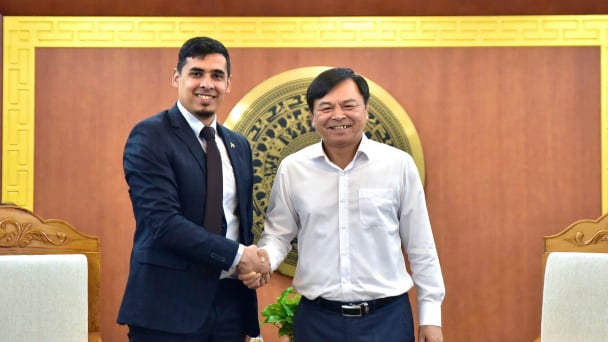
(VAN) Vietnam's participation in the AGROALBA project helps open up broader investment opportunities for enterprises to access markets in the fields of agriculture.
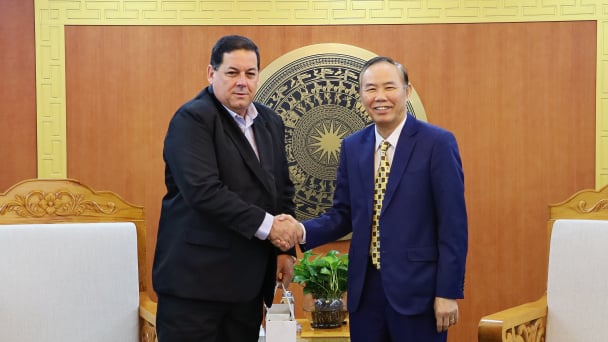
(VAN) On May 13, Deputy Minister of Agriculture and Environment Phung Duc Tien held a meeting with Cuban Deputy Minister of the Food Industry Javier Francisco Agular Rodriguez.
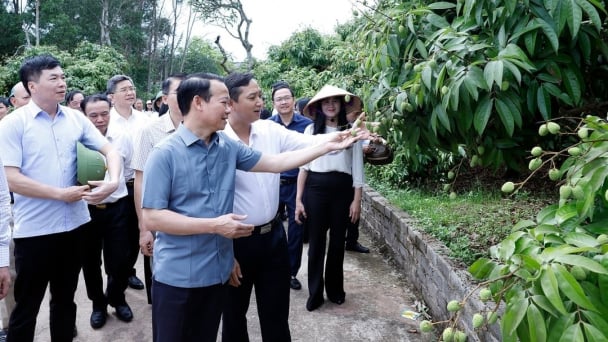
(VAN) Agriculture and environment sector experienced a 3.74% increase in growth during the first four months of 2025, with exports surpassing 21 billion USD. This growth was sustained by effective reforms and a trade surplus.

(VAN) Taiwan offers a promising market for Vietnamese turmeric; however, it enforces stringent standards, particularly concerning residual additives, colourants, and substances with potential carcinogenic effects.

(VAN) Through activities at Vietnam Sea and Island Week 2025, solutions will be developed to fully harness the potential and advantages of Vietnam's marine economy.
![Multi-channel, multi-directional Vietnamese agricultural markets: [4] EVFTA and the 0% tax advantage](https://t.ex-cdn.com/nongnghiepmoitruong.vn/608w/files/linhnhp/2025/05/12/day-chuyen-che-bien-tom-tai-1-nha-may-cua-sao-ta-205536_359-1044193.jpg)
(VAN) The near-complete elimination of import tariffs on Vietnamese goods makes the EVFTA the highest commitment the EU has ever made to a partner in its signed trade agreements.